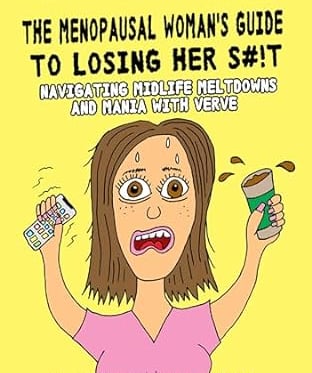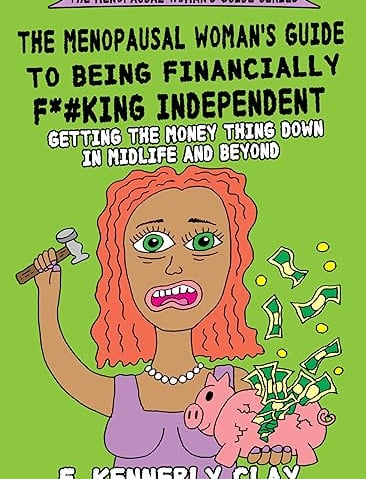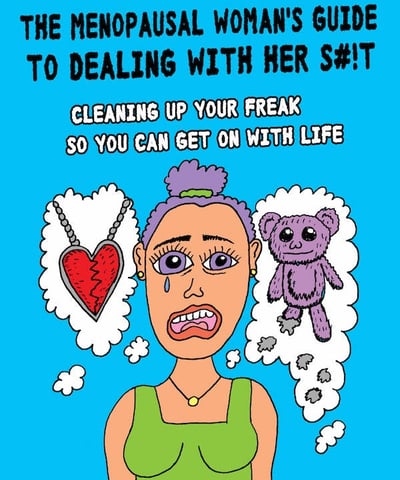Menopause Fatigue and What to Do About It
Unlike regular tiredness, menopause fatigue can't be alleviated by rest or sleep. It's a heaviness that hangs over each day. Here's how to cope with it.
MENOPAUSAL SYMPTOMSMENOPAUSAL DEPRESSION
Kennerly Clay
7/13/20246 min read


What can I do about menopause fatigue?
Menopause fatigue is characterized by a persistent sense of tiredness that goes beyond the usual weariness experienced after a long day. Women often describe it as an overwhelming and relentless exhaustion that affects both their physical and emotional well-being.
Unlike regular tiredness, which eases with rest, menopause fatigue lingers, dragging down daily life. It’s a heavy weight that can blur the lines between exhaustion and emotional strain, making Menopause and Mental Health a real challenge and sometimes triggering Depression in Menopause.
Fatigue may be the first shit to hit the menopausal fan. It was for me. I was overcome by such relentless exhaustion, I could barely get through my work day, let alone come home to two young children. To survive, I'd often leave my office at lunchtime and go sit in my car, listening to a sleep meditation for 20 minutes, which zonked me out right in the middle of the day.
If you or someone you know is in crisis, please call 988, the Suicide & Crisis Lifeline in the United States.
What does menopause fatigue feel like?
Common symptoms of menopause fatigue include a pervasive lack of energy, difficulties in concentrating, and a general sense of malaise. It's not uncommon to feel like you're constantly dragging yourself through the day, struggling to complete even simple tasks that once felt effortless. This chronic fatigue can also manifest in emotional ways, leading to increased irritability, mood swings, and a diminished sense of motivation.
When you talk to other women in menopause, you'll find shared experience. I've talked to so many women in peri/menopause who have experienced extreme fatigue, which often sounds like this:
"completely wiped out"
"can't think straight"
"can't get out of bed"
"so exhausted I'm afraid of driving"
"need to go to bed as soon as I get home"
The hormonal changes that occur during menopause play a significant role in this type of fatigue. Fluctuations in estrogen and progesterone levels can disrupt the body's natural energy regulation, leading to feelings of exhaustion. These hormonal shifts can also affect sleep patterns, resulting in poor-quality sleep that exacerbates the sense of fatigue.
It's important to recognize that the exhaustion you're experiencing is not simply a result of overexertion, but rather a symptom of deeper physiological changes. Even better, if you can start adjusting your lifestyle and behavior early on, you may be able to develop appropriate strategies to manage your energy levels and improve your overall quality of life.
(In one study) 85.3% of post-menopausal women and 46.5% of peri-menopausal women reported symptoms of physical and mental exhaustion compared to just 19.7% of the pre-menopausal women.
- Menopause journal
Menopause fatigue and depression: How they're connected
Hormonal changes in menopause not only affect the reproductive system but also have profound impacts on mood and mental health in menopause. Estrogen, in particular, plays a crucial role in regulating neurotransmitters such as serotonin, which is pivotal in maintaining mood stability. The reduction in estrogen levels during menopause can thus lead to mood swings, anxiety, and depression.
Menopause fatigue is a common symptom that often overlaps with depressive symptoms. Women experiencing menopause fatigue frequently report sleep disturbances, low energy, and feelings of hopelessness. These symptoms are strikingly similar to those of clinical depression, making it challenging to distinguish between the two conditions. This overlap can lead to a misdiagnosis or delayed treatment, exacerbating the overall condition.
Scientific studies have shown a marked increase in the risk of depression during menopause. For instance, a study published in the Journal of Affective Disorders found that women are 40% more likely to experience depression in perimenopause than those who aren't experiencing any menopausal symptoms. Expert opinions also emphasize that the physical exhaustion associated with menopause fatigue can intensify depressive symptoms, creating a vicious cycle where fatigue leads to depression, which in turn worsens fatigue.
This is exactly what it was like for me. The deadening, heavy weight of fatigue all day long contributed to an increasingly low mood, to the point where I just didn't want to get out of bed or go about life at all.
This cyclical relationship highlights the importance of addressing both menopause fatigue and depression concurrently. When you experience fatigue, your ability to cope with stress diminishes, potentially leading to feelings of despair and hopelessness. Conversely, depression can deplete energy levels and disrupt sleep patterns, further exacerbating menopause fatigue.
The deadening, heavy weight of fatigue all day long contributed to an increasingly low mood, to the point where I just didn't want to get out of bed or go about life at all.
How to cope with fatigue in menopause
As with most anything related to our health, it's critical to be proactive. That means: Nobody's coming to your rescue if you're experiencing fatigue in menopause. You have to find ways to cope with your symptoms by changing your behavior while also seeking professional help before you go into a downward spiral.
Lifestyle changes
Managing menopause fatigue effectively often begins with incorporating specific lifestyle changes. Regular exercise plays a crucial role in enhancing energy levels and improving overall well-being. Engaging in activities such as walking, swimming, or yoga can help reduce fatigue and boost mood.
My personal preference is Pilates. The stretching and core work helps with chronic pain issues and I never break into a sweat. (BTW, I hate sweating and hard work, especially at this age.) A few years ago, I upped my commitment by joining Club Pilates, which forces me to get to a class once a week. Through that one class, I get core strength, release of stress and tension throughout my body, and a whole-body workout that mostly happens lying down.
Obviously, eating healthfully is critical. The last thing you need when you're experiencing fatigue in menopause is heavy carbs or sugar that are going to send you way up and way down. Reach for fruits, vegetables, whole grains, and lean proteins for essential nutrients that support energy production and hormonal balance.
It's hard to preach about sleep. Most menopausal women I've talked to feel like they barely get any. But of course adequate sleep is another cornerstone in managing menopause fatigue, so it may help to climb into bed a little earlier since you're probably going to be wide awake at 3:30 a.m. At least by establishing a consistent sleep schedule and creating a relaxing bedtime routine, you can quiet down your day and ease into sleep mode. Everyone suggests limiting screen time before bed, but most people I know are using their screens right up until bedtime. Let's not be perfectionistic here. You may need the assistance of melatonin before bed, or a sleep app to help you drift off.
I am all for meditation apps that include mindfulness practices and ways to let go and release. Incorporating regular relaxation techniques into your daily routine can lead to improved mental clarity and emotional stability, aiding in the overall management of menopause symptoms.
Medical interventions
For some women, lifestyle changes may not be sufficient to manage menopause fatigue, necessitating medical interventions. You've probably heard about hormone replacement therapy (HRT), a common treatment that can help alleviate menopausal symptoms by replenishing estrogen and progesterone levels. I chose the bio-identical hormone replacement therapy (BHRT) route, under the guidance of a functional and integrative medicine doctor. It was eye-opening to discover I had zero free testosterone in my body when I was in my late-40s. Testosterone, among other things, helps give us energy, motivation and clarity. I had lost all three.
Within a few months of beginning the BHRT, I had a new spring in my step and the brain fog lifted. HRT and BHRT both have benefits and risks. Consult with a healthcare provider you trust to explore your options.
Antidepressants may also be prescribed, particularly if menopause fatigue is accompanied by symptoms of depression. These medications can help improve mood and energy levels, making daily activities more manageable. One important thing I discovered, along with my therapist, was that menopausal fatigue and low energy led to low mood which crept right into depression.
You may also need to consider other medications to address specific symptoms such as sleep disturbances or anxiety. (But don't let anyone be dismissive of your symptoms. There are many different approaches to managing menopausal symptoms like fatigue. Writing you a prescription and wishing you luck is a lame and limited one.)
Also check out counseling and support groups for emotional support and practical advice from others experiencing similar challenges. These resources can help you feel understood and less isolated, and a little less looney as you wander aimlessly through the menopausal years.
Wanna talk more about menopause fatigue and depression?
Books for women who are losing it in menopause
Mental Health
Losing your mind in peri/menopause?
The menopausal woman's guide series
Financial Health
Had enough of financial insanity?
Personal Growth
Triggers? Old stuff kicking up?
Related topics
Explore helpful articles, tips, and advice for women who are losing their shit in menopause.
Community
Stay Connected
© 2024. Eclectic Content, Inc. All rights reserved.






